GALLUP NEWS SERVICE
PRINCETON, NJ -- January 22 marks the 33rd anniversary of the 1973 landmark Roe v. Wade Supreme Court decision legalizing abortion. It also marks the start of the week during which Judge Samuel A. Alito will likely receive a positive recommendation by the U.S. Senate Judiciary Committee for his confirmation to the U.S. Supreme Court. That's one step closer to what his detractors fear will be a shift in abortion views on the nation's highest court, replacing the moderate Sandra Day O'Connor with the seemingly more conservative Alito.
Senate Democrats are reportedly weighing their options -- including possibly using a filibuster to delay a vote -- for blocking what otherwise appears to be a clear path to Alito's confirmation by the full Senate. Some liberal activists are still trying to mount a grass roots campaign against Alito.
To the extent that Alito tilts more "pro-life" than did O'Connor, the Democrats appear to have public opinion on their side. According to a Jan. 6-8 CNN/USA Today/Gallup poll, about half of Americans consider themselves "pro-choice" about abortion while 42% call themselves "pro-life." When asked about their preference for changing current abortion laws, only 38% of Americans favor making abortion laws more strict; most are generally content with keeping abortion legal, saying the laws should remain the same (39%) or be made less strict (20%).
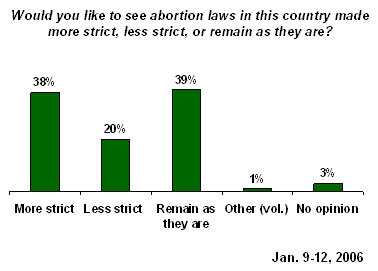
Furthermore, only 34% of Americans say they would like to see Alito confirmed were they convinced he would overturn the Roe v. Wade decision; 56% would not like to see him confirmed in this case.
On the other hand, Gallup polling also indicates that the abortion issue is not pivotal to most Americans. Only 27% say the issue will be "extremely" important to their vote for Congress this fall, although another 25% say the issue will be "very" important.
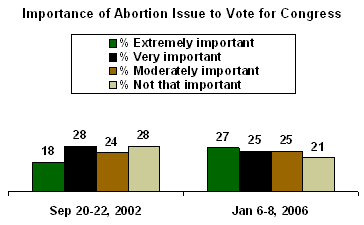
Abortion is more likely to be rated extremely important today than it was four years ago -- 27% in 2006 vs. 18% in 2002. Still, among 12 issues rated in the recent poll, abortion ranks as the least important to voters, which is a risk for Democrats: It is not clear how welcome a knock-down, drag-out confirmation battle centered on abortion would be to the public.
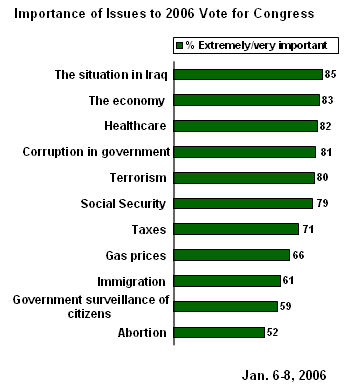
Also, according to a Gallup poll conducted last year, close to half of Americans (45%) say it is very important that future nominees to the Supreme Court share their own views about abortion. Pro-life Americans are much more likely than pro-choice Americans to feel this way (53% vs. 37%).
|
Importance That Supreme Court Nominees Share Your Abortion Views |
|||
|
National adults |
Pro-choice |
Pro-life |
|
|
% |
% |
% |
|
|
Very important |
45 |
37 |
53 |
|
Somewhat important |
31 |
35 |
28 |
|
Not too important |
15 |
19 |
10 |
|
Not at all important |
8 |
8 |
8 |
|
No opinion |
1 |
1 |
1 |
The net result is that one-quarter of Americans (24%) feel strongly that future justices must share their pro-life views; slightly fewer (18%) say it is very important those justices share their pro-choice views.
Complex Views About When Abortion Should Be Legal
Although a minority of Americans expressly say they want stricter abortion laws, a majority of the public hold views about when abortion should be legal that would in fact impose greater limits if codified.
Gallup's long-term trend on the legality of abortion, most recently asked in November 2005, finds a majority of Americans favoring fairly strict limits on abortion, saying it should be legal in only a few or no circumstances. Fewer than half favor liberal abortion laws, saying it should be legal in all or most circumstances. This division of opinion about the legality of abortion has been fairly stable for the past decade.
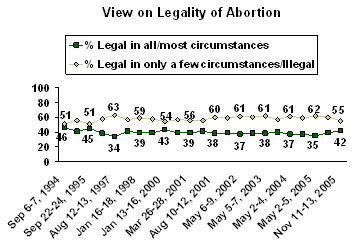
The level of support for abortion varies greatly depending on the specific circumstances under which the procedure could take place. It takes little probing, for example, to find that support for abortion rises to as high as 85% in circumstances when the woman's life is in danger, and drops to as low as 10% when conducted in the third trimester of a pregnancy.
Americans appear to be sympathetic to many of the more extreme hardship circumstances that compel some women to choose abortion. Most Americans think abortion should be legal if it is necessary to preserve the life of the mother (77% express that view) or when the pregnancy is the result of rape or incest (76%). A majority also support termination when the woman's mental health is endangered (63%), and when there is evidence the baby would be born physically (56%) or mentally impaired (55%).
On the other hand, one circumstance Americans reject as valid is an abortion due to financial problems. Only 35% say abortion should be legal when the woman or family cannot afford to raise the child; 61% disagree with this rationale.
When Gallup asked the public about the legality of abortion according to the stage of the development of the fetus rather than the specific circumstances involved, nearly two-thirds say abortion should be legal in the first three months of pregnancy. Two-thirds or more say it should be illegal in the second and third trimesters.
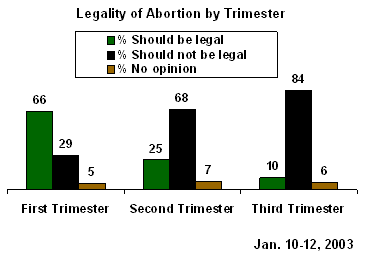
"Partial Birth" Procedures Consistently Opposed
Congress originally introduced the Partial-Birth Abortion Ban Act in 1995, and after being twice vetoed by President Bill Clinton, President George W. Bush eventually signed it into law in 2003. In the latest Gallup survey on this issue (from January 2003), 70% of Americans supported legislation to ban partial-birth abortions except in cases where it is necessary to save the life of the mother; just 25% opposed it. This is consistent with Americans' general opposition to abortion in the second and third trimesters.
Roe Widely Supported
In reviewing public opinion about abortion, it is important to remain mindful of the fact that despite broad support for fairly restrictive legal limits on abortion, most Americans fundamentally believe abortion should remain legal. Hence, polls that ask about overturning Roe v. Wade consistently find broad opposition. In July 2005, only 28% of the public told Gallup they would like to see the 1973 decision overturned; 63% were opposed.
Similarly, in January 2003 only 38% favored a constitutional amendment "to ban abortion in all circumstances, except when necessary to save the life of the mother." Nearly 6 in 10 (59%) opposed this.
Survey Methods
The latest results are based on telephone interviews with randomly selected national samples of 1,003 adults, aged 18 and older, conducted Jan. 6-8, 2006, and 1,003 adults, aged 18 and older, conducted Jan. 9-12, 2006. For results based on samples of this size, one can say with 95% confidence that the maximum error attributable to sampling and other random effects is ±3 percentage points. In addition to sampling error, question wording and practical difficulties in conducting surveys can introduce error or bias into the findings of public opinion polls.
